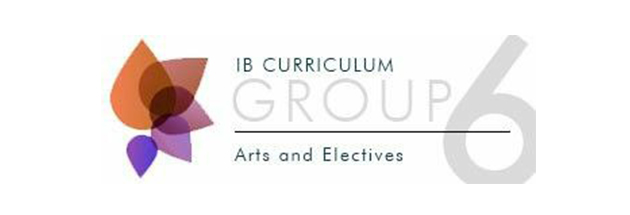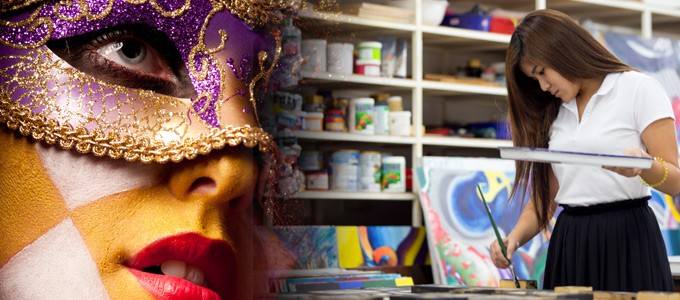IB Arts & Electives courses are designed to foster critical, reflective and informed practice, help students understand the dynamic and changing nature of the arts, explore the diversity of arts across time, place and cultures, and express themselves with confidence and competence.

The visual arts course enables students to engage in both practical exploration and artistic production, and in independent contextual, visual and critical investigation. The course is designed to enable students to study visual arts in higher education and also welcomes those students who seek life enrichment through visual arts.
Students should be introduced to art concepts and techniques such as:
Students should be encouraged to explore art, craft and design traditions from past, present and emerging cultural backgrounds, and local, national and international contexts.
At the end of the course, students should have produced studio work that communicates their understanding of conceptual content, their technical skill and their sense of critical awareness. They should also have developed an understanding of the artistic process from the generation of initial ideas through the various stages that lead to the completion of a final studio work.
All studio work needs to reflect personal involvement and be linked to the investigation contained in their workbooks.
The students will stage an exhibition of their studio work. There will be a visiting external assessor who will view the exhibition, read the workbook and hear what the students have to say about their work.
The students select media related to their individual strengths and interests, whilst understanding that the facilities may provide some limitations. Students should be reminded that quality work that shows a developing maturity of artistic understanding at the end of the course is preferable to work that shows a superficial acquaintance with a large number of different skills and techniques.
As with all choices of media, visual arts students who wish to work in alternative or emerging media must remember that this is a visual arts course and their work will be assessed against criteria specific to visual arts.
The purpose of the investigation workbooks is to encourage personal investigation into visual arts, which must be closely related to the studio work undertaken.
The investigation workbooks should incorporate contextual, visual and critical investigation. They should function as working documents and support the student’s independent, informed investigation and studio practice. Investigation workbooks provide an opportunity for reflection and discovery and they play a key role in allowing ideas to take shape and grow. They should contain visual and written material that address contextual, visual and critical aspects of the investigation. They should also reflect the student’s interests and include wide-ranging first-hand investigations into issues and ideas related to visual arts. There should be a balance in the investigation between analytical and open-ended discussion, illustrating the student’s creative thinking.
The workbook is assessed internally and selected pages are sent away to be moderated.
Film Studies is a stimulating addition to the Arts section of the IB syllabus. It is a subject that takes us beyond simply considering Hollywood as the only form of cinema and allows students to engage with this highly influential form of communication and consider the impact that world cinema has on both a personal level and the effect on other countries and cultures.
The course will work to build students critical and creative skills to improve their knowledge of cinema and appreciate it as a medium of communication as well as an art form, to encourage independence of thinking and their enjoyment of film.
Over the two years students will analyse and research cinema from around the world focusing on topics ranging from the Hollywood studio system, political and social comment evident in British cinema, right through to the cinematography of European films, the high energy Bollywood movies and the symbolic use of anime in Japanese cinema. From this, candidates will be expected to examine film production, form and reception, and relate these to cultural, social and political contexts.
The course is ideal for anyone who has a genuine interest in film and the arts. Creative thinking and practical skills will be encouraged to promote critical autonomy.
Over the duration of the course assessment consists of:

Film Studies is a stimulating addition to the Arts section of the IB syllabus. It is a subject that takes us beyond simply considering Hollywood as the only form of cinema and allows students to engage with this highly influential form of communication and consider the impact that world cinema has on both a personal level and the effect on other countries and cultures.
Theatre is a composite art that is forever evolving in new forms. It nourishes, sustains and extends the human spirit. It is a means of exploring society and relationships within it. Through it, there may emerge possibilities for individual and communal understanding. Theatre is about transformation. It is the application, through play, of energy and imagination to frame, reflect, expose, critique and speculate. These activities should engage and develop the sensibilities of all the students who participate in them. By studying theatre, and engaging with it practically, students will discover how elusive, fascinating and varied theatre can be.
At one extreme, theatre is national, institutionalized and commercial, while at the other it is provincial, subversive and experimental. The Diploma Programme theatre course is designed to encourage students to examine theatre in its diversity of forms around the world. This may be achieved through a critical study of the theory, history and culture of theatre, and will find expression through workshopping, devised work or scripted performance. Students will come to understand that the act of imagining, creating, presenting and critically reflecting on theatre in its past and present contexts embodies the individual and social need to investigate and find explanations for the world around us.
The theatre course emphasizes the importance of working individually and as a member of an ensemble. Students are encouraged to develop the organizational and technical skills needed to express themselves creatively in theatre. A further challenge for students following this course is for them to become aware of their own perspectives and biases and to learn to respect those of others. This requires a willingness to understand alternative views, to respect and appreciate cultural diversity, and to see the varied role that theatre plays in reflecting these. As a result, the theatre course can become a way for students to celebrate the international and intercultural dynamic that inspires and sustains some forms of contemporary theatre, while appreciating the specifically local origins that have always given rise to performance, and which, in many parts of the world, still do.
At the core of the theatre course lies a concern with clarity of understanding, critical thinking, reflective analysis, effective involvement and imaginative synthesis—all of which should be achieved through practical engagement in theatre.
Theatre students at both SL and HL are presented with a common core syllabus that encourages the development of certain skills, attributes and attitudes, as described in the “Objectives” section of this guide. Due to the nature of the theatre course, there may be no great difference in the complexity or artistic merit of the work produced by students at SL and HL. However, the difference in recommended teaching times at SL and HL signals a clear distinction between the demands made on students. It is expected that students at HL will use the extra time available to develop their personal research and practice in theatre, and to extend their understanding of the ideas, practices and concepts encountered during the course. The differences between the requirements of the theatre course at SL and HL are outlined in the table below.
The theatre course at both HL and SL requires no previous experience in drama or theatre. Since the course is designed to enable students to experience theatre on a personal level, achievement in this subject is reflected in how students develop, extend and refine the knowledge, skills and attitudes necessary for studying this art form. Students’ individual ability to be creative and imaginative, and to communicate in dramatic form, will be challenged and extended through the theoretical and practical content of the course.
The theatre course provides a relevant learning opportunity for a diverse range of students as it lays an appropriate foundation for further study in theatre, performing arts and other related subjects. In addition, by instilling discipline, and refining communication and group-work skills, it offers a valuable course of study for students who may wish to pursue a career or further education studies in areas unconnected to theatre.
Students at both HL and SL should keep a journal from the outset of the course. This is the student’s own record, charting development, challenges and achievements, and, as such, students are free to determine what form it should take (written, audio and/or visual). The aim of the journal is to support and nurture development and reflection, and it is expected that much of the students’ assessed work will emerge from it. Students should also be encouraged to explore connections between different areas of learning throughout the course. The journal is not directly assessed or moderated but, since what it contains will reflect the sensibility of individual students, and will contain their responses to the different areas of learning, it should be regarded as a fundamental activity of the course.
At Uplands the IB Theatre course is approved holistically focusing on the three core components of the curriculum. In the s each of the core components are explained. The nature of the course demands that from year to year, the choice of texts, theatre practices, methods of performance will change and timing of projects will change. However, each theatre experience will be used to enhance the students understanding of the nature and components of the art form.
Course activities include participation in practical theatre experience, critical evaluation of external productions and dramaturgy research. Independent projects will allow students the opportunity to focus on their individual areas of interest.
Uplands is an active member of The International School Theatre Association and students regularly attend and host International Theatre Festivals and IB Theatre Arts Symposiums.
Our theatre course can become a way for students to celebrate the international and intercultural dynamic that inspires and sustains some forms of contemporary theatre, while appreciating the specifically local origins that have always given rise to performance, and which, in many parts of the world, still do.
Music functions as a means of personal and communal identity and expression, and embodies the social and cultural values of individuals and communities. This scenario invites exciting exploration and sensitive study.
Music, and all of its associations, may vary considerably from one musical culture to another: yet music may share similarities. Such richness offers a variety of ways to encounter and engage with a constantly changing world.
A vibrant musical education fosters curiosity and openness to both familiar and unfamiliar musical worlds.Through such a study of music we learn to hear relationships of pitch in sound, pattern in rhythm and unfolding sonic structures. Through participating in the study of music we are able to explore the similarities, differences and links in music from within our own culture and that of others across time. Informed and active musical engagement allows us to explore and discover relationships between lived human experience and specific sound combinations and technologies, thus informing us more fully of the world around us, and the nature of humanity.
The Diploma Programme music course provides an appropriate foundation for further study in music at university level or in music career pathways. It also provides an enriching and valuable course of study for students who may pursue other careers. This course also provides all students with the opportunity to engage in the world of music as lifelong participants.
The International School of Penang (Uplands)
Jalan Sungai Satu,
11100 Batu Feringgi, Penang,
Malaysia
E: [email protected]
T: +60 4 881 9777
F: +60 4 881 9778
